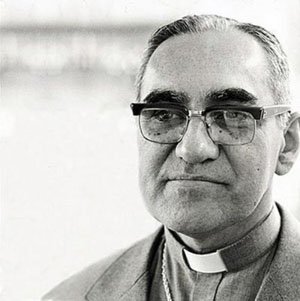
Early life
Oscar Romero was born into a large family on August 15, 1917 in El Salvador. Although they had more money than many of their neighbours, Oscar’s family had neither electricity nor running water in their small home, and the children slept on the floor.
Oscar’s parents could not afford to send him to school after the age of twelve, so he went to work as an apprentice carpenter. He quickly showed great skills, but Oscar was already determined to become a priest. He entered the seminary at the age of fourteen and was ordained a priest when he was 25 in 1942.
In 1970, he became Auxiliary Bishop in San Salvador. In 1974 he became Bishop of Santiago de Maria. At this time, Oscar Romero was described as a conservative, not wanting to break from tradition. He supported the hierarchy who encouraged conformity. He was uncomfortable with social action that challenged political leaders.
Growing awareness
During his two years as Bishop of Santiago de Maria, Romero was horrified to find that children were dying because their parents could not pay for simple medicines. He began using the resources of the diocese and his own personal resources to help the poor, but he knew that simple charity was not enough. He wrote in his diary that people who are poor should not just receive handouts from the Church or the government but participate in changing their lives for the future.
In 1977, Romero became Archbishop of San Salvador, the capital city. The situation in El Salvador was becoming worse and he couldn’t remain silent any longer. The military were killing the Salvadorian people - especially those demanding justice such as teachers, nuns and priests – including Romero’s good friend, Fr Rutilio Grande. Thousands of people began to go missing. Romero demanded that the President of El Salvador thoroughly investigate the killings, but he failed to do so.
Voice of the voiceless
In his actions and words, Oscar demanded a peace that could only be found by ensuring people had access to basic needs and their rights upheld. He raised awareness globally about the people in his country who had been killed or "disappeared". When he visited the Vatican in 1979, Oscar Romero presented the Pope with seven detailed reports of murder, torture, and kidnapping throughout El Salvador.
In 1979, the number of people being killed rose to more than 3000 per month. Oscar Romero had nothing left to offer his people except faith and hope. He continued to use the radio broadcast of his Sunday sermons to tell people what was happening throughout the country, to talk about the role of the Church and to offer his listeners hope that they would not suffer and die in vain.
Martyrdom
On March 23, 1980, after reporting the previous week’s deaths and disappearances, Oscar Romero began to speak directly to soldiers and policemen: “I beg you, I implore you, I order you... in the name of God, stop the repression!” The following evening, while saying Mass in the chapel of Divine Providence Hospital, Archbishop Oscar Romero was shot by a paid assassin.
Only moments before his death, Romero spoke these prophetic words: “Those who surrender to the service of the poor through love of Christ will live like the grain of wheat that dies… The harvest comes because of the grain that dies.” Like many great leaders who have fought for truth, Oscar Romero was killed and became a martyr, but his voice could not be silenced. He is a symbol of hope in a country that has suffered poverty, injustice and violence.
